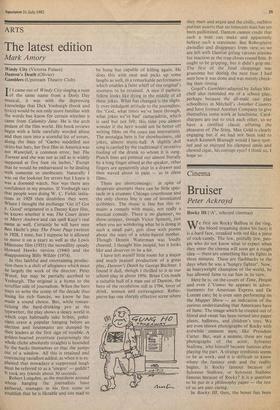ARTS
The latest edition
Mark Amory
Gamblers (Upstream Theatre Club)
If 1 came out of Windy City singing a tune of the same name from a Doris Day musical, it was with the depressing knowledge that Dick Vosburgh (book and lyrics) would be not only more familiar with the words but know for certain whether it came from Calamity Jane. He is the arch Pedant of the film world. His book reviews begin with a little carefully worded abuse and then turn into a scornful list of errors, along the lines of 'Garbo modelled not skirts but hats, her first film in America was not Waterfall, a common error, but The Torrent and she was not as tall as is widely supposed at five foot six inches.' Except that he would be embarrassed to be dealing With someone so unobscure. Naturally I was on the lookout for errors but I knew it was a doomed watch. Nor was there any confidence in my pounce. If Vosburgh says that people were doing W. C. Fields imita- tions in 1929 then doubtless they were. Where I thought the exchange 'Get it? Got it. Good' originated in a Danny Kaye film, he knows whether it was The Court Jester or Merry Andrew and can spell Kaye's real name as well. Certainly he will have seen Ben Hecht's play The Front Page (written In 1928, I note, but I suppose he is allowed to move it on a year) as well as the Lewis Milestone film (1931) the incredibly speedy Howard Hawks version (1940) and the disappointing Billy Wilder (1974).
In this faithful and entertaining produc- tion there is a shift of allegiance which must .be largely the work of the director, Peter Wood, but may be partially ascribed to Vosburgh. The original is a hymn to the scruffier side of journalism. When the hero stays to write the scoop of the decade thus losing his rich fiancée, we know he has made a sound choice. But, while roman- ticising the hard-drinking pro at the typewriter, the play shows a sleazy world in Which cops habitually take bribes, politi- cians crave a popular hanging before an election and lieutenants are dumped by their leaders at the first sign of trouble. A golden-hearted prostitute (surprisingly the Whole cliché absolutely straight) is hounded by the hacks themselves so that she jumps out of a window. All this is retained and convincing racialism added, as when it is ex- plained that nowadays a suppressed laugh Must be referred to as a `snegro' — geddit? It took my friends about 30 seconds.
Robert Longden, as the murderer around Whose hanging the journalists have gathered, manages in his first scene to establish that he is likeable and too mad to be hung but capable of killing again. He does this with ease and picks up some laughs as well, in a remarkable performance which enables a faint whiff of the original's sourness to be retained. A nice if pathetic fellow looks like dying in the middle of all these jokes. What has changed is the slight- ly over-indulgent attitude to the journalists, the 'God, what times we've been through, what jokes we've had' camaraderie, which is said but not felt; this time you almost wonder if the hero would not be better off writing films on the coast (an innovation). The nostalgia here is for showbusiness, old jokes, almost music-hall. A slightly dull song is carried by the traditional if inventive fooling of the drunk to whom it is sung. Punch lines are pointed out almost literally by a long finger aimed at the speaker, other fingers are apparently shut in a drawer and then waved about in pain — as in silent films.
There are shortcomings: in spite of desperate attempts there can be little spec- tacle in a crummy Chicago courthouse and the only chorus line is one of intoxicated scribblers. The music is fine but this re- mains a comedy with music, not really a musical comedy. There is no glamour, no show-stopper, though Victor Spinetti, just when you are wondering what he is doing in such a small part, gets close with poems about the tears of a white-haired mother. Though Dennis Waterman was loudly cheered, I thought him insipid; but it looks like and deserves to be a hit.
I have left myself little room for a major and much praised production of a great play, Danton 's Death by George Biichner. I found it dull, though I thrilled to it as our school play in about 1956. Brian Cox made a suitable bull of a man out of Danton, the hero of the revoltition still in 1794, lover of drink, women and extravagance. Robes- pierre has one sharply effective scene where
they meet and argue and the chilly, ruthless puritan asserts that no innocent man has yet been guillotined. Danton cannot credit that such a man can make and apparently believe such a statement. But Robespierre dwindles and disappears from view so we are left with DanCOn giving various reasons for inaction as the trap closes round him. It ought to be gripping, but it didn't grip me. The first of the final choppings was gruesome but during the next four I had seen how it was done and was merely check- ing their timing.
Gogol's Gamblers adapted by Julian Mit- chell also reminded me of a school play, perhaps because the all-male cast play schoolboys in Mitchell's Another Country and have formed Another Company to give themselves some work at lunchtime. Card- sharpers are out to trick each other, so we have a certified classic offering the pleasures of The Sting. Max Gold is clearly engaging but if we had not been told to watch Kenneth Branagh would I have spot- ted and so enjoyed his clamped smile and chewed cigar, his corrupt eyes? I think so, I hope so.






































 Previous page
Previous page